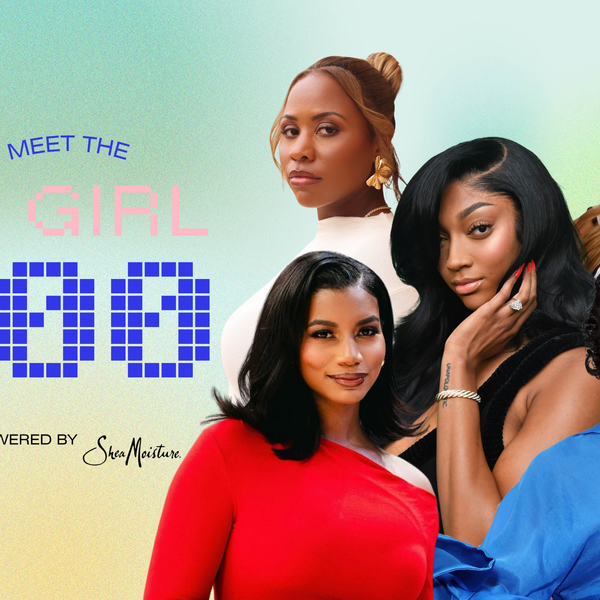When They See Us: 5 Things You Didn't Know About The Central Park Five

Nearly 30 years ago, five teens from New York were convicted of a crime that would ultimately rewrite the narrative of black youth in America and paint a horrific picture of how black Americans are mistreated by police and the criminal justice system as a whole.
The late-eighties were a tumultuous time for race relations in this country where everything was seen in black and white. This was made abundantly clear after a 28-year-old white woman was found bloody, beaten, raped, and left for dead one night in Central Park, making teen in the area a suspect. After a night of subpar police work, detectives had five black and brown boys in custody for a crime that we would later learn they did not commit.
After garnering a whole gang of false confessions and literally no substantial evidence, five boys, aged 13-16 were convicted of rape, robbery, attempted murder, and sexual abuse, and were sentenced to up to 15 years in prison.
Ava Duvernay's four-part Netflix series When They See Us tells the story of these young boys and their families who fought for justice and were ultimately cleared of all charges. Since the limited series was released, the world has reacted in a major way, even causing lead prosecutor on the case, Linda Fairstein to delete her social media pages. If you haven't seen it yet, it's time to hit up your ex for that Netflix password, sis, because this series offers vital information that we can all learn from when it comes to protecting ourselves in this country. Here's a few things you might not have known about the case:
Donald Trump Helped Create The Narrative
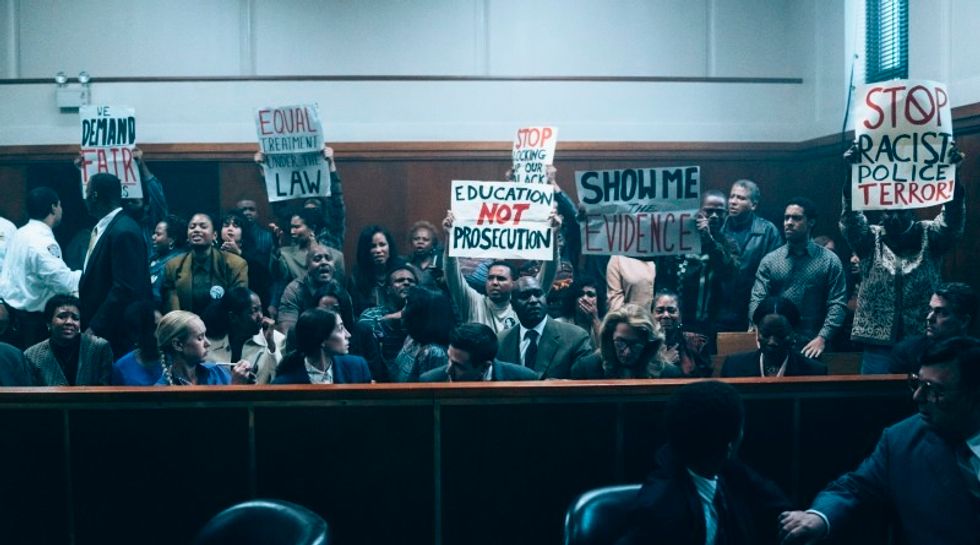
Netflix
Racism. Injustice. Corruption. It's only right that 45 take his rightful place in this history of f*ckery. Donnie was making problematic political moves way back in 1989, when he paid for full page ads in New York newspapers (totaling about $85,000) that called for the five boys to face the death penalty after their convictions.
Even after the victims were cleared and the real perpetrator was convicted, he stood strong on his belief that the five men were guilty and refused to issue any form of apology.
It's Been A Hard Week Linda Fairstein, And It's Only Monday
Listen, Linda. You know you done f*cked up, right? While I'm sure her original intentions were as pure as any white woman with undeniable racial bias, Linda Fairstein is a true example of the type of people we DO NOT need in our criminal justice system.
Her willingness to demonize and take the lives away from five young boys based on a whim was criminal and according to Black Twitter, we're not opposed to street justice via social media. Since the documentary aired, the former prosecutor has deleted all of her social media accounts and a petition has been created that calls for Amazon, Audible, and all other book retailers to remove all of her books from their platforms.
The Central Park 5 Asked Ava To Tell Their Story
After the debut of Ava Duvernay's film, Selma, in 2015, everyone was dying to know what Ava had up her sleeve next, including Raymond Santana, who reached out to the popular director via tweet. After a brief exchange via DM, Ava put her thinking cap on and got to work.
"I found myself at a dinner in Harlem with Kevin [Richardson], Yusef [Salaam], and Raymond. It was very powerful to have them all together. The thing that really struck me is no one's ever heard their story beyond 'the crime,' or the night itself. The documentary does a beautiful job of recounting that night, but when I sat with them and they told me about everything else, that was really fascinating."
Two years later, the series was announced and the boys would finally have a chance to tell their story in its entirety. Although there had been a wildly popular PBS documentary that shed light on their experience, they expressed that no one had ever told their story beyond their alleged crimes.
Ava told Vanity Fair that although she was honored to tell their story, it wasn't easy and she even provided a crisis counselor on set.
"It wasn't a very healthy thing to do. But they asked me to do it, and I wanted to tell their story. Their story wasn't told when they were boys. It was told for them and it was twisted and it was lies. There was so much more to it, and I wanted to tell it for them."
The Real Reason The Last Episode Is Dedicated To Korey Wise
When creating the limited series, Korey expressed that his experience was much different from the Central Park Five, because as the oldest of the group, he was treated much differently both before and after his conviction. Ava explained that because of this, she wanted to make sure that she told his story much differently.
"When I first met Korey, within 15 minutes he said, 'There is no Central Park Five, it's four plus one.' And I never forgot that. He looked me in the eyes and he said, 'They had an experience and I had an experience. They are not the same.' He had some pain and some anger about being lumped into the Central Park Five when the four were in juvenile hall detention."
Korey, who only went to jail to accompany a scared friend, wasn't even on the list of suspects but was eventually coerced into a false confession on-camera that would eventually seal his fate at Riker's Island and other maximum security prisons for the next 14 years. His time in prison would ultimately allow him to uncover the true culprit in the Central Park jogger case, but nothing could give back to him the last decade and a half that had been spent in solitary confinement.
"They eventually all went to adult prison, but they got out when he was continuing to serve time. And he was always in an adult prison; he never experienced juvenile detention. Going into Riker's at age 16, as you see in the piece, it made a very singular experience. And I wanted to honor that, so I knew I had to find a way to break him out."
New York Never Admitted Any Wrongdoing
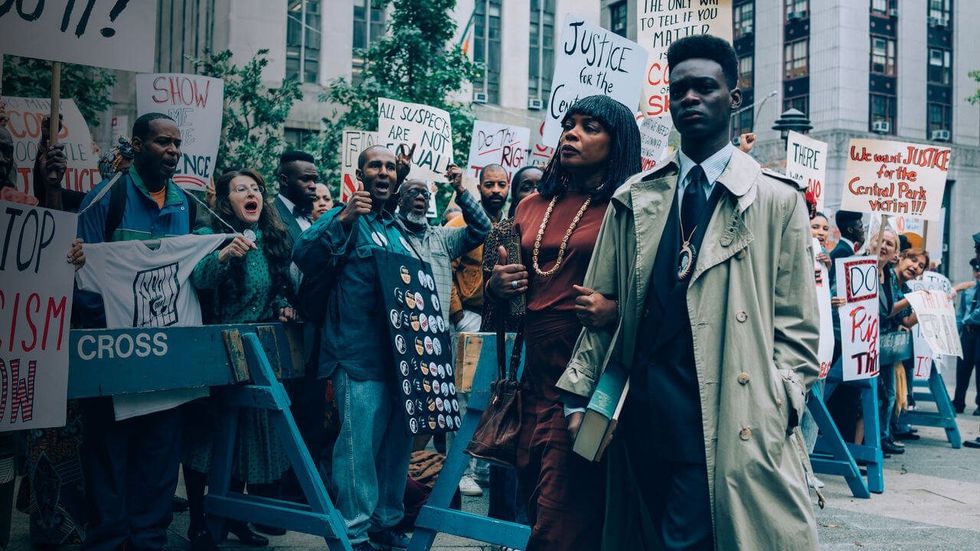
Netflix
A true sign of maturity is being able to admit when you're wrong, so we're going to need the New York Police Department to put on their big girl panties and apologize. Like our current POTUS, the NYPD proved to be sore losers after the convictions of the Central Park Five were overturned and vacated.
While the city settled the case, offering the men a total of $41 million, they admitted to no wrongdoing. Ava told NPR:
"The city never apologized; they settled. No one on the side of the prosecution ever apologized. They've stuck by the fact that even though the real man came out and said: I did it, I did it alone. Even though all of that physical evidence was from him, was matched to the victim, and it was in fact him, and only him, these people still refuse to acknowledge that they — not made a mistake — lied. Lied."
When They See Us is now streaming on Netflix.
Featured image courtesy of Netflix.
- The True Story Behind Netflix's 'When They See Us' - Central Park ... ›
- “When They See Us” is a heartrending portrait of the Central Park ... ›
- Central Park 5 Timeline & True Story Behind Netflix's When They ... ›
- Netflix's When They See Us is the enraging story of the Central Park ... ›
- The Central Park Five: 'We Were Just Baby Boys' - The New York ... ›
- Central Park Five Tragedy Reframed in Netflix Series When They ... ›
- When They See Us (TV Mini-Series 2019– ) - IMDb ›
Because We Are Still IT, Girl: It Girl 100 Returns
Last year, when our xoNecole team dropped our inaugural It Girl 100 honoree list, the world felt, ahem, a bit brighter.
It was March 2024, and we still had a Black woman as the Vice President of the United States. DEI rollbacks weren’t being tossed around like confetti. And more than 300,000 Black women were still gainfully employed in the workforce.
Though that was just nineteen months ago, things were different. Perhaps the world then felt more receptive to our light as Black women.
At the time, we launched It Girl 100 to spotlight the huge motion we were making as dope, GenZennial Black women leaving our mark on culture. The girls were on the rise, flourishing, drinking their water, minding their business, leading companies, and learning to do it all softly, in rest. We wanted to celebrate that momentum—because we love that for us.
So, we handpicked one hundred It Girls who embody that palpable It Factor moving through us as young Black women, the kind of motion lighting up the world both IRL and across the internet.
It Girl 100 became xoNecole’s most successful program, with the hashtag organically reaching more than forty million impressions on Instagram in just twenty-four hours. Yes, it caught on like wildfire because we celebrated some of the most brilliant and influential GenZennial women of color setting trends and shaping culture. But more than that, it resonated because the women we celebrated felt seen.
Many were already known in their industries for keeping this generation fly and lit, but rarely received recognition or flowers. It Girl 100 became a safe space to be uplifted, and for us as Black women to bask in what felt like an era of our brilliance, beauty, and boundless influence on full display.
And then, almost overnight, it was as if the rug was pulled from under us as Black women, as the It Girls of the world.
Our much-needed, much-deserved season of ease and soft living quickly metamorphosed into a time of self-preservation and survival. Our motion and economic progression seemed strategically slowed, our light under siege.
The air feels heavier now. The headlines colder. Our Black girl magic is being picked apart and politicized for simply existing.
With that climate shift, as we prepare to launch our second annual It Girl 100 honoree list, our team has had to dig deep on the purpose and intention behind this year’s list. Knowing the spirit of It Girl 100 is about motion, sauce, strides, and progression, how do we celebrate amid uncertainty and collective grief when the juice feels like it is being squeezed out of us?
As we wrestled with that question, we were reminded that this tension isn’t new. Black women have always had to find joy in the midst of struggle, to create light even in the darkest corners. We have carried the weight of scrutiny for generations, expected to be strong, to serve, to smile through the sting. But this moment feels different. It feels deeply personal.
We are living at the intersection of liberation and backlash. We are learning to take off our capes, to say no when we are tired, to embrace softness without apology.
And somehow, the world has found new ways to punish us for it.

In lifestyle, women like Kayla Nicole and Ayesha Curry have been ridiculed for daring to choose themselves. Tracee Ellis Ross was labeled bitter for speaking her truth about love. Meghan Markle, still, cannot breathe without critique.
In politics, Kamala Harris, Letitia James, and Jasmine Crockett are dragged through the mud for standing tall in rooms not built for them.
In sports, Angel Reese, Coco Gauff, and Taylor Townsend have been reminded that even excellence will not shield you from racism or judgment.

In business, visionaries like Diarrha N’Diaye-Mbaye and Melissa Butler are fighting to keep their dreams alive in an economy that too often forgets us first.
Even our icons, Beyoncé, Serena, and SZA, have faced criticism simply for evolving beyond the boxes society tried to keep them in.
From everyday women to cultural phenoms, the pattern is the same. Our light is being tested.

And yet, somehow, through it all, we are still showing up as that girl, and that deserves to be celebrated.
Because while the world debates our worth, we keep raising our value. And that proof is all around us.
This year alone, Naomi Osaka returned from motherhood and mental health challenges to reach the semifinals of the US Open. A’ja Wilson claimed another MVP, reminding us that beauty and dominance can coexist. Brandy and Monica are snatching our edges on tour. Kahlana Barfield Brown sold out her new line in the face of a retailer that had been canceled. And Melissa Butler’s company, The Lip Bar, is projecting a forty percent surge in sales.

We are no longer defining strength by how much pain we can endure. We are defining it by the unbreakable light we continue to radiate.
We are the women walking our daily steps and also continuing to run solid businesses. We are growing in love, taking solo trips, laughing until it hurts, raising babies and ideas, drinking our green juice, and praying our peace back into existence.
We are rediscovering the joy of rest and realizing that softness is not weakness, it is strategy.
And through it all, we continue to lift one another. Emma Grede is creating seats at the table. Valeisha Butterfield has started a fund for jobless Black women. Arian Simone is leading in media with fearless conviction. We are pouring into each other in ways the world rarely sees but always feels.

So yes, we are in the midst of societal warfare. Yes, we are being tested. Yes, we are facing economic strain, political targeting, and public scrutiny. But even war cannot dim a light that is divinely ours.
And we are still shining.
And we are still softening.
And we are still creating.
And we are still It.

That is the quiet magic of Black womanhood, our ability to hold both truth and triumph in the same breath, to say yes, and to life’s contradictions.
It is no coincidence that this year, as SheaMoisture embraces the message “Yes, And,” they stand beside us as partners in celebrating this class of It Girls. Because that phrase, those two simple words, capture the very essence of this moment.
Yes, we are tired. And we are still rising.
Yes, we are questioned. And we are the answer.
Yes, we are bruised. And we are still beautiful.

This year’s It Girl 100 is more than a list. It is a love letter to every Black woman who dares to live out loud in a world that would rather she whisper. This year’s class is living proof of “Yes, And,” women who are finding ways to thrive and to heal, to build and to rest, to lead and to love, all at once.
It is proof that our joy is not naive, our success not accidental. It is the reminder that our light has never needed permission.
So without further ado, we celebrate the It Girl 100 Class of 2025–2026.
We celebrate the millions of us who keep doing it with grace, grit, and glory.
Because despite it all, we still shine.
Because we are still her.
Because we are still IT, girl.
Meet all 100 women shaping culture in the It Girl 100 Class of 2025. View the complete list of honorees here.
Featured image by xoStaff
Give Thanks: 10 Tips For Hosting An Absolutely Awesome Friendsgiving
If you’ve never checked out an episode of the ReLiving Single Podcast featuring Maxine and Synclaire — oops, I mean Erika Alexander and Kim Coles — it’s worth listening to an episode or two; especially if you’re someone like me who watches the Living Single reruns on TV One, sometimes, like they just came out. Good times.
And what does this even remotely have to do with Friendsgiving? Well, if you ever wondered what the origin story of this non-holiday-holiday is, legend has it that it’s mostly due to the combination of a 2007 tweet and the show that tries to act like it wasn’t birthed out of Living Single: Friends (I’m not the only one who feels this way either; you can read more about all of that here, here and here).
Apparently, there was a Thanksgiving episode that featured all of the friends having dinner together. And y’all, there was simply no way that I was going to mention the latter without shouting out the original (amen?).
Okay, so with that out of the way — Friendsgiving. Something that I appreciate about twists to holidays like this is that it’s a reminder that there is no one way to celebrate special occasions. And so, if, for whatever the reason, you will not or cannot be with family during the holiday season, there are certainly other alternatives at your disposal.
That being said, if the thought of spending time with friends this Thanksgiving is something that you’d like to do, yet you’re not sure how to host it in a way that will make Friendsgiving a fan favorite for your entire circle — I’ve got 10 suggestions that can make the planning process easy as pumpkin (or sweet potato) pie.
1. Position Chrysanthemums or Orchids for Your Table Décor

Unsplash
Let’s start with décor first. Listen, aside from cleaning up your place, you don’t have to be over the top. If you put together a really nice centerpiece or put a flower at each table setting, honestly, you’re all good. And if you’re someone who is big on details and symbolism, my recommendation would be to go with some chrysanthemums and/or orchids.
When it comes to chrysanthemums, not only are they a peak fall flower, they represent things like friendship and happiness. And orchids? They tend to bloom during the fall and spring seasons and, not only are they about luxury, certain orchid colors also symbolize friendship (for the record, yellow roses symbolize friendship too). Perfect.
2. Incorporate Scents That Cultivate Gratitude
Speaking of cultivating a warm and inviting space, you can never go wrong with scented soy candles — or at least having an essential oil diffuser in a few spots. Some scents that actually help to bring in the spirit of gratitude include vanilla, jasmine, ginger, cedarwood and frankincense.
3. Use Upscale Paper Products to Dine With

Unsplash
Let’s be real — a lot more of us would probably host events in our home if it wasn’t for the mess that is left behind in our kitchen once the festivities are over. Wanna avoid that? Use paper plates. No, I don’t mean the cheap Styrofoam ones. SMDH. These days, there are paper (and plastic) plate brands that will low-key blow your mind when it comes to how bougie they look. Some that are worth considering are located here, here and here.
4. Handwrite Thank-You Notes (Use Them As Place Settings)
If you’re like Tiffany (from the HBO series Insecure — what a time) was at that memorable dinner party when all hell broke loose between Lawrence and Issa and you’re pretty anal — I mean, particular — LOL — about place settings, it’s a nice touch to pick up some blank thank-you cards that you can write a personalized “I’m thankful for you because…” message in. Place each one where you’d like each friend to sit. They won’t see it coming and it’s a really nice touch.
5. Have Everyone Bring Their Favorite Homemade Dish

Unsplash
Okay, and what if what has you on the fence about hosting is you don’t feel like doing a ton of cooking? Chile, this is where the concept of having a potluck comes in. Get everyone to bring the dish that they claim they cook the best and make sure to let them know how many individuals you plan on coming (so that they will make enough). You can even make a game out of it by having everyone anonymously vote for the first, second and third best dishes out of the bunch. Take it up a notch by having a prize for each winner.
6. Take a Warm Drink and Dessert Poll Beforehand
You know what isn’t discussed enough about dinner parties? Folks bringing desserts that other people don’t even like. SMDH. You can avoid this from becoming an issue at your Friendsgiving by sending an email (most people prefer that to group chats; let’s be real — and make sure to BCC everyone as well) asking everyone to share what their top three favorite desserts and warm drinks are. Then pick the top 2-3 out of the bunch. That way, you won’t have a ton of (for instance) coffee cake or apple cider lying around that no one even wanted in the first place.
7. Create a Signature Friendsgiving Mocktail and Cocktail
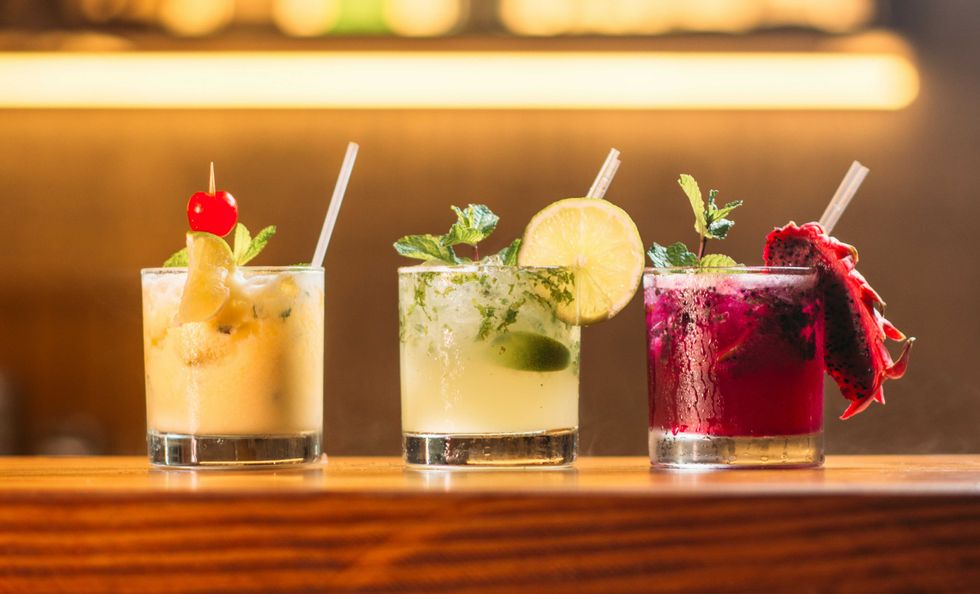
Unsplash
Speaking of drinks, another way to make your Friendsgiving memorable is to come up with a signature mocktail (for those who don’t consume alcohol) and cocktail. For the mocktail, you can also poll your friends about their favorite mocktail or fruits and come up with a mixture of your own. For the cocktail — although National Friendship Day is actually in August, I did peep that there are certain drinks that have been created in its honor. Some of them are located here for you to do a bit of tweaking on (if you’d like).
8. Ask Everyone to Share Their “Favorite Friend Quality” of Another
You know how it’s customary for everyone to go around and share what they are truly thankful for before having dinner? Well, to continue along with the Friendsgiving theme, have each person share what their favorite friend quality is about the person to their right. If folks are just meeting each other for the first time, instead they can share what they value the most in friendship overall, along with a story of how it was displayed to them personally over the past 12 months.
9. Send Each of Your Guests Home with a Fresh Gratitude Journal
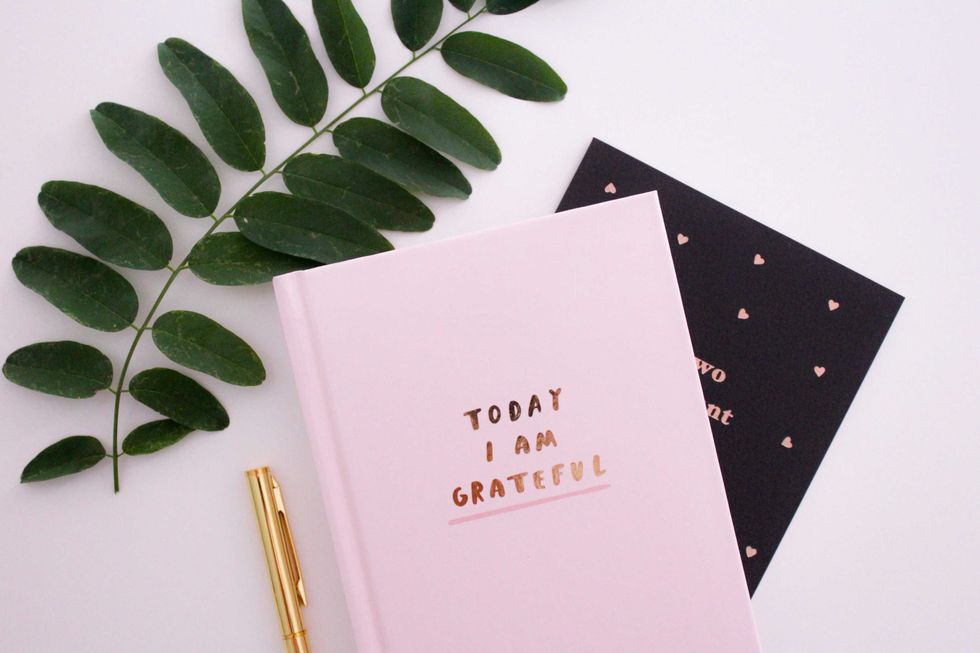
Unsplash
Wanna send folks home with a nice parting gift? It would be so on-trend to give each of them a gratitude journal. Listen, we are in some crazy times right through here (at least in the States) and so, encouraging your friends to set some time aside, regularly, to think about and then outwardly express what they are grateful for? That helps to keep stress down, keep things in perspective and it reminds us all to maintain a positive mindset as much as possible.
10. Watch a Nostalgic Movie
While everyone is enjoying dessert and drinks, how about watching a movie that brings back fond memories? A list of some of the most popular movies to come out previous Thanksgiving weekends is located here and a list of some favorite Black holiday-themed films can be found here. It’s a way to wind down and share some laughs before everyone heads home.
___
Friendsgiving. What a wonderful way to celebrate your friends while also observing Thanksgiving in a way that is totally on your terms. And now that you know how to put it together, what are you waiting for? Hit your friends up and let them know that, whether it’s on actual Thanksgiving Day or a few days before or after, you’ve got a special dinner in mind.
One that has a good time with amazing friends written ALL over it.
Let’s make things inbox official! Sign up for the xoNecole newsletter for love, wellness, career, and exclusive content delivered straight to your inbox.
Featured image by PeopleImages/Shutterstock



